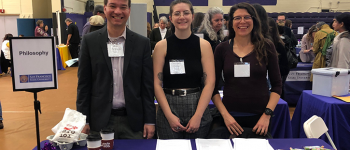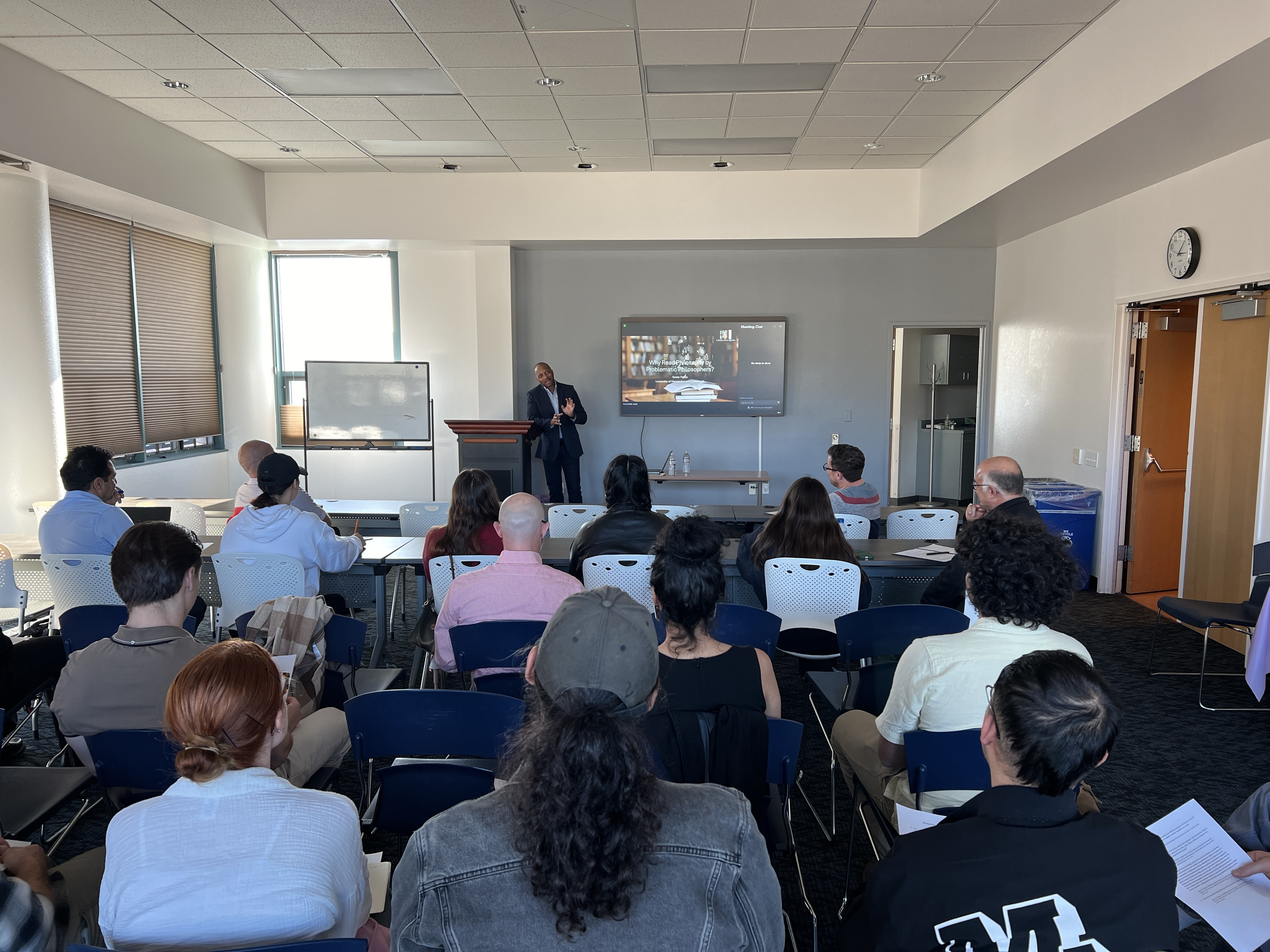The Master of Arts in Philosophy is designed for students wishing to extend their knowledge of, and competence in, philosophy; for students seeking a teaching career where the master’s degree is required; and for students who are planning to do further study elsewhere. The program is wide-ranging and flexible, enabling students to concentrate on a number of different areas within philosophy.
We offer a two-year program leading to a Master of Arts in Philosophy. We admit students who have a B.A. in Philosophy, but we also admit students with undergraduate degrees in other fields.
Because our world-class graduate faculty are active members of the philosophical profession, we are able to offer our students unique learning opportunities that reflect the most state-of-the-discipline research interests of the faculty. Our program offers a wide variety of graduate seminars ranging from Philosophical Issues in Artificial Intelligence to Decolonizing the Philosophical Canon and beyond. Our program includes an innovative pedagogy program, integrating the art of teaching philosophy into the graduate student curriculum while offering hands-on teaching and mentorship opportunities in faculty-led public philosophy programs such as Corrupt the Youth. Many of our graduate students go on to prestigious Ph.D. programs, law schools, accept teaching positions in community colleges and universities, or find careers in various non-profit organizations.
Admission Criteria
Required:
- 3.0 GPA
- Cal State Apply Application
- Writing Sample
Optional:
- The GRE is neither recommended or encouraged
- Letters of Recommendation
Deadlines
- The application deadline for Fall is April 15th
- The application deadline for Spring is December 1st
Apply to Our M.A. Program Online at CalStateApply
We are excited that our entire M.A. Program application now happens through SF State's new system: Cal State Apply.
Please complete all four quadrants of the application.
In submitting the Department of Philosophy's portion of your application, you will be required to provide the following materials:
- A brief description of your teaching experience (if you have any). (Note that teaching experience does not have any impact on admission into the M.A. program).
- Unofficial transcripts, which you will upload.
- A short statement answering at least one of the following questions:
1. Briefly describe the areas of philosophy, philosophical problems and/or philosophers you wish to study.
2. Briefly discuss your interest in one area of philosophy, philosophical problem or philosopher you have enjoyed studying. -
Attach a writing sample representative of your academic work, preferably in philosophy, though it can be from any discipline.
Optional Letters should be uploaded using the online system provided by Cal State Apply. If there are any issues, the letters can be emailed directly to grdphl@sfsu.edu.
Graduate Standing and Classified Standing
Students admitted into the program are considered either "Classified," "Conditionally classified," or "Unclassified."
Classified Standing
If the student's undergraduate work meets the department’s criteria and shows promise of a successful completion of the graduate program, he or she will be admitted to classified standing. Only those who have already satisfied all the prerequisites prior to admission are "classified" graduate students.
Conditionally Classified Standing
Most applicants who do not have a degree in Philosophy or who lack any of the above prerequisites are admitted as conditionally classified graduate students. Status as a conditional graduate student does not affect a student’s general financial aid. Some University scholarships are restricted to classified students. Students in either category - classified or conditionally classified - are still considered "real" graduate students
We generally recommend that students who are admitted as conditionally classified finish their prerequisites before commencing on graduate level work.
Degree Requirements
To earn a M.A. in Philosophy, students must complete the following (effective Fall 2025):
- PHIL 715 – Seminar in Graduate Writing
- 4 Graduate Seminars in Philosophy
- Three elective courses (9 units) within or outside of the department
- Three units of Pedagogical Training*
- PHIL 896+ 895 - Culminating Experience
Pedagogical Training is a new requirement effective Fall 2023. This can be satisfied in a number of ways, typically by enrolling in PHIL 718. Discuss with your advisor on the best way to fulfill this requirement.
30 units total
Academic Standards
Academic standards for Graduate Classified, Graduate Conditionally Classified, and Post-Baccalaureate Students are as follows:
Good Standing: Maintain a cumulative grade point average of 3.0 (B) or better in any term.
Probation: Will be subject to probation when the grade point average falls below 3.0 (B) in any term.
Will be subject to declassification from the graduate degree and/or advanced credential program and from further enrollment in the university if, during the semester of probation, there is a failure to achieve the minimum cumulative grade point average of 3.0 (B).
First Level Advising: Graduate Coordinators
Olivia Walters, Graduate Program Coordinator
Email: grdphl@sfsu.edu
Office: HUM 389
Phone: (415) 338-2470
Olivia handles the administrative aspects of the graduate program and is the first point of contact for general inquiries and assistance. Please consult with her regarding your graduation paperwork and scheduling your thesis defense.
Dr. Mohammad Azadpur, Graduate Coordinator
Email: azad@sfsu.edu
Office: HUM 387
Dr. Azadpur handles all aspects of advising for the M.A. program. Both new and continuing students should consult with him on appropriate coursework for the M.A. program.
Second Level: M.A. Culminating Experience Advisor
Once a student has completed a Proposal for Culminating Experience (PCE), the chair of their thesis will serve as the student’s advisor.
Note: Special paperwork is required to allow semi-retired faculty and lecturers in Philosophy or other departments to serve as readers (no such faculty may serve as thesis chairs).
Eligible chairs are the following:
- Dr. Azadpur, azad@sfsu.edu
- Dr. Islami, arezooi@sfsu.edu
- Dr. Landy, landy@sfsu.edu
- Dr. Montemayor, cmontema@sfsu.edu
- Dr. Salzberger, salzberger@sfsu.edu
- Dr. Sowaal, asowaal@sfsu.edu
- Dr. Wilcox, swilcox@sfsu.edu
Students are strongly urged to consult with the graduate coordinator and their faculty advisors at least once each semester.
The following advising schedule should be kept by new and continuing graduate students:
New students should seek out advising with Dr. Azadpur prior to registering for courses.
Continuing students should meet with their advisor at the beginning of each semester in order to discuss their progress in the program.
Evaluating Prior Coursework
Students need not have completed an undergraduate major in philosophy to be considered for the M.A. program.
Applicants’ prior academic work will be evaluated to see that a number of undergraduate courses have been fulfilled with a grade of 3.0 or better (B) and that the courses reach the level of upper-division coursework in philosophy at SF State. The sole exception to the upper-division coursework criterion is for the Logic (PHIL 205), a lower-division course. Please note that the Department of Philosophy offers a Formal Logic Challenge Exam.
Required Undergraduate Courses:
These are required beginning in the Spring 2024 admissions cycle. Please refer to your admissions letter for clarity.
- Logic (must be equivalent to PHIL 205)
- A course in the History of Philosophy (ancient or medieval)
- Modern Philosophy (PHIL 303)
- Being and Knowing (PHIL 321)
- Ethics (PHIL 450)
Please see the current schedule of classes.
Placement as of Fall 2025
Six out of eight students who applied to Ph.D. programs or law schools accepted offers from the following schools:
- Arizona State University, School of Law
- Cornell University
- Fordham University
- Rutgers University
- University of Miami
- University of Minnesota
Placement as of Fall 2024
Five out of twelve students who applied to Ph.D. programs accepted offers from the following schools:
- Princeton
- Emory
- UC San Diego
- UC Santa Cruz
Placement as of Fall 2023
Three out of five students who applied to Ph.D. programs accepted offers from the following schools:
- CUNY
- Indiana University, Bloomington
- University of Massachusetts, Amherst
Placement as of Fall 2022
Six out of eleven students who applied to Ph.D. programs accepted offers from the following schools:
- Syracuse University
- UC Davis
- Trinity College Dublin
- UC Santa Cruz
- University of Georgia
- UC Irvine
Placement as of Fall 2021
Three out of seven students who applied to Ph.D. programs accepted offers from the following schools:
- University of California Santa Cruz
- University of Nebraska - Lincoln
- University of Illinois
Placement as of Fall 2020
Ten of our M.A. students began advanced studies as of fall 2020 at the following schools:
- Boston University
- State University of New York, Binghamton
- University of California, Berkeley
- University of California, Davis
- University of California, Los Angeles
- University of California, San Diego
- University of California, Santa Cruz
- University of Wisconsin, Madison
Placement as of 2019
Eleven of our M.A. Students accepted offers at following schools:
- Johns Hopkins University
- Syracuse University
- University of California, Davis
- University of California, Irvine
- University of Illinois, Urbana-Champaign
- University of Pennsylvania (2)
- University of Western Ontario
- University of Arizona Law School
Funding Your Degree
Funding Information for the M.A. Program
The Department of Philosophy at SF State values our university’s role as a public institution, and we are dedicated to providing a philosophical education to all those who desire and are qualified to receive it. Though we cannot offer funding for every admitted graduate student, there are several options to mitigate the cost of tuition and attendance.
California Residents can apply for:
- State University Grants, which cover almost all of tuition for domestic applicants who qualify.
- University and college-wide scholarships posted on SF State Academic Works.
Out-of-State Applicants from Alaska, Arizona, California, Colorado, Guam, Hawai’i, Idaho, Montana, Oregon, Nevada, New Mexico, North Dakota, Northern Mariana Islands, South Dakota, Utah, Washington, Wyoming: You pay in-state tuition through the WICHE program!
- Other out-of-state applicants can apply for residency in your second year. If you do so, and if you apply on time and are eligible, you might also receive the State University Grant.
- Read more on applying for residency.
International applicants:
- You may be eligible for University scholarships posted on Academic Works (described below in the section below, "Scholarships, Fellowships and Awards".
- Please consult with the Office of International Students on the process of acquiring a visa, and financial issues related to that process.
1. FAFSA
Students seeking the maximum in financial aid for fall entry should submit a FAFSA by the end of February, even if they have not yet applied to the Philosophy M.A. program. The University has put together a helpful guide to financial aid.
2. Scholarships and Fellowship Programs
Scholarships
We have several department opportunities designated for both incoming graduate students and continuing graduate students. Please visit our Scholarships page to view department and university scholarships.
Fellowships and Other Awards
California Pre-Doctoral Program (Sally Casanova Pre-Doctoral Scholars)
The California Pre-Doctoral Program is designed to increase the pool of potential faculty by supporting the doctoral aspirations of CSU students who have experienced economic and educational disadvantages. Announcements and application forms are circulated early each spring. Students are selected by a committee of faculty from the California State University and the University of California. This is a one-time award. Current or former pre-doctoral scholars are not eligible to reapply.
The Graduate Equity Fellowship program aims to increase diversity by encouraging students with educationally or economically disadvantaged backgrounds and outstanding academic records to pursue and complete master's and doctoral degrees. The fellowship is only available to students admitted to an SFSU master's or doctoral degree program. Students in blended bachelor’s/master’s degree programs are eligible once they enroll as graduate students.
The SF State Fellowships Office keeps an extensive list of National and CSU fellowships and scholarships, many of which could be of interest to graduate students.
3. Teaching Opportunities
There are three types of teaching opportunities available to graduate students in the Department of Philosophy:
- PHIL 717: Projects in Teaching Philosophy: students receive course credit for assisting faculty in large lecture classes.
- Instructional Student Assistant (ISA) Positions: students assist professors with class management (managing assignments, grading, tutoring, or facilitating group discussions) for pay.
- Graduate Teaching Associateships (GTAs): students teach their own introductory-level courses.
To submit an application for ISA, Work Study, or GTA employment, apply through the employment page.
Please note: receiving a teaching position in any form does not waive tuition costs. Please see the employment page for more information on expected salaries associated with these positions.
Financial Assistance Links
PHIL 896 + 895: Directed Readings and Culminating Experience (effective Fall 2025)
Students will work to develop their Culminating Experience Project in both of two ways: with their CE Director as part of PHIL 895: Culminating Experience Project and with their colleagues in workshop meetings as part of PHIL 896: Directed Readings in Philosophy. In the semester in which students enroll, they must register for both PHIL 895 and PHIL 896.
Philosophy can be practiced in a variety of ways and the Department of Philosophy aims to facilitate student’s autonomy in choosing their approach. Models of Culminating Experience Projects include the further development of a paper on a philosophical issue, a teaching module, a reflective essay, a piece of public philosophy, a grant application, or a philosophical authoethnography, but proposals for other kinds of projects can also be proposed and will be evaluated on a case-by-case basis. (See Graduate Handbook for more details.)
The semester prior to beginning the thesis, students invite two tenure-track faculty from the Department of Philosophy to form their committee and approve their Proposal for Culminating Experience (PCE). One of these faculty will be the student’s CE advisor, and will work closely with the student to see their project to completion. A third member may also be added, especially if a student anticipates applying to PhD programs, and so will need three letters of recommendation. Students submit the PCE through the Office of Graduate Studies Docusign portal for all of their committee members, and the Graduate Coordinator, to sign.
PHIL 896: Directed Readings in Philosophy
In this course, the Graduate Coordinator will divide students into groups depending on their project proposals. The groups will meet every other week throughout the semester to present, consider, and discuss their ongoing work. At each meeting at least one student will present their work to the group, and all other students will submit written feedback on that work within one week of the meeting on Canvas.
Students can access the PHIL 896 packet. We highly recommend that students review this document in order to better acquaint themselves with the structure of the exam.
All meetings will be held online over Zoom. (Schedule to be posted)
PHIL 895: Culminating Experience Project
During the semester in which students work on their projects, meetings with CE advisors will be scheduled between the student and CE advisor. Different faculty members may have varying expectations about the process of mentoring a thesis candidate, so it is important for students to find out what their committee members require and consult with them frequently in the process. At the end of the semester, students will give and oral defense of their project at a conference organized by the Graduate Coordinator. Typically, this will consist of a 10-15 minute presentation of their project followed by questions from the student’s committee and any audience members present.
*A note about the Master's Thesis (PHIL 898)
For students who matriculated prior to Fall 2025, PHIL 898 will continue to be available as a culminating experience option. If students wish to change to the new culminating experience options, please consult with the Graduate Coordinator team on the necessary steps.
Philosophy Graduate Student Handbook and Deadlines
Students: Download the Philosophy Graduate Student Handbook, which covers in-depth steps involved in the progress toward the degree.
You are responsible for meeting all of the internal deadlines for paperwork.
Important departmental and university deadlines are listed on page two of the Philosophy Graduate Student Handbook.
Helpful Links


